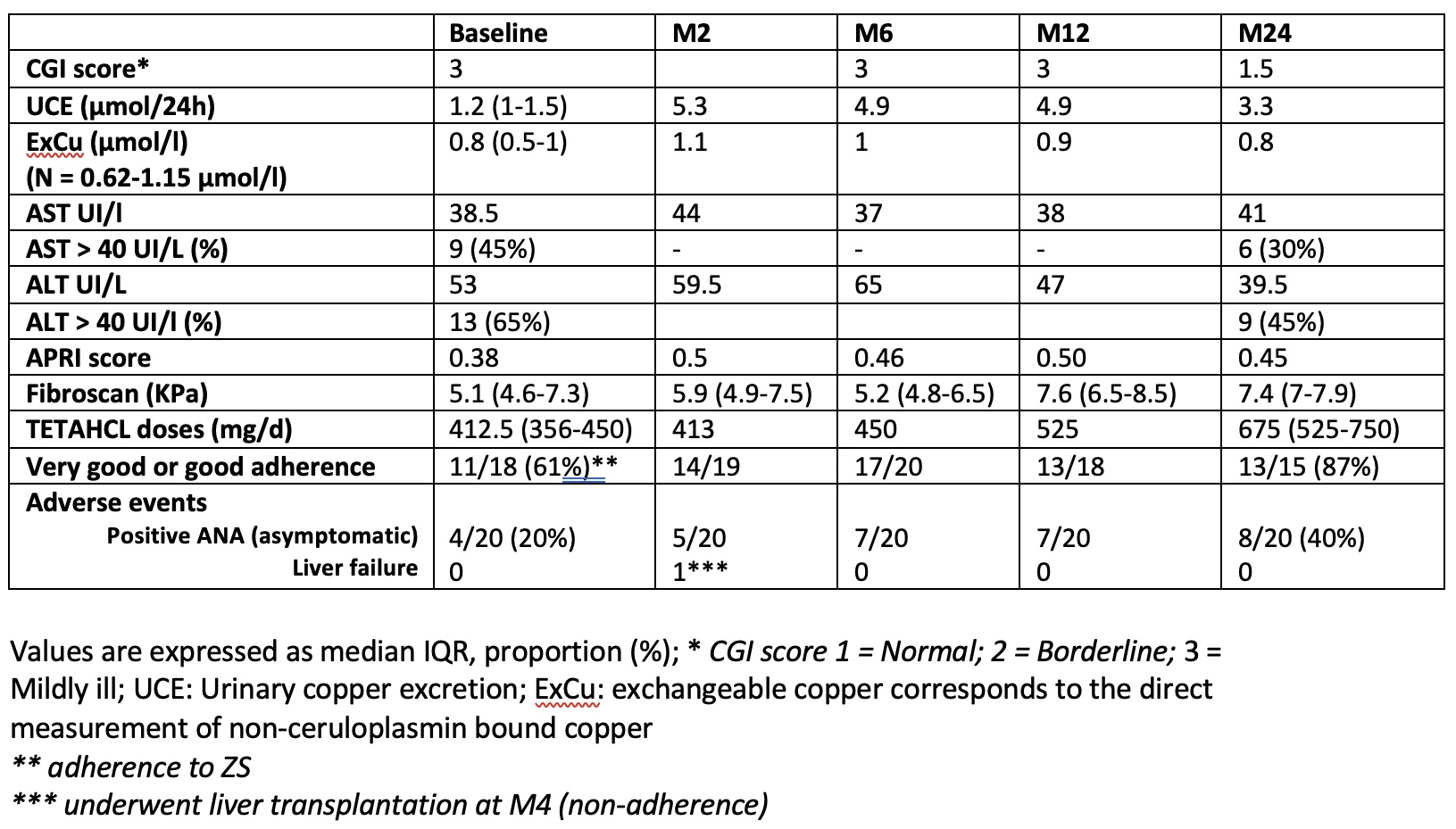Category: Rare Genetic and Metabolic Diseases
Objective: To assess the clinical and biochemical effects of transitioning from zinc salts (ZS) to trientine tetrahydrochloride (TETA4HCL) in Wilson disease (WD) patients over a two-year period, including 6 patients presenting neurological symptoms.
Background: Treatments of WD aim at reducing copper accumulation. While ZS are prescribed for asymptomatic WD and/or during maintenance, they are associated with gastrointestinal side effects, poor adherence, and loss of efficacy. The chelator TETA4HCL is an alternative for WD patients intolerant to or failing ZS therapy.
Method: A prospective study from the French WD Registry analysed clinical global impression (CGI), adherence, biochemical outcomes (see table), Unified Wilson’s Disease Rating Scale (UWDRS), adverse events, and dose adjustments in patients transitioning from ZS to TETA4HCL since 2019. Subgroup analysis focused on neurological WD patients.
Results: Twenty patients (14 hepatic and 6 hepato-neurological forms) were studied. Reasons for switching included gastrointestinal side effects (13), loss of efficacy (6), and practical considerations (1). Before transitioning to TETA4HCL, 65% of patients had elevated transaminases. At the two-year follow-up, patients remained clinically stable. To achieve normal transaminases and exchangeable copper (ExCu) levels, a 39% increase in the initial daily dose of TETA4HCL was necessary. Nonetheless, approximately 45% still exhibited elevated ALT levels. Physician-reported adherence to treatment indicated improvement. In the subgroup of neurological patients, improvements in UWDRS scores were reported in all patients but two. No significant changes were observed in brain MRI imaging.
Conclusion: Transitioning to TETA4HCL demonstrated stability in WD patients over two years, with improved adherence and a favorable safety profile. However, challenges persist in optimizing dosing strategies, as some patients had not achieved full stabilization, suggesting potential underdosing of TETA4HCL. A daily dose of TETA4HCL of at least 675 mg seems necessary, but further studies are required to confirm this minimum dosage. The study supports TETA4HCL as a therapeutic option for WD intolerant to or failing ZS therapy, with ongoing monitoring and optimization of dosing strategies.
Table
To cite this abstract in AMA style:
A. Poujois, MA. Obadia, N. Oussedik-Djebrani, E. Couchonnal-Bedoya, F. Ory-Magne, D. Debray. Transition from Zinc Salts to Trientine Tetrahydrochloride in Wilson Disease: Clinical and Biochemical Effects over Two Years – the ZICUP study [abstract]. Mov Disord. 2024; 39 (suppl 1). https://www.mdsabstracts.org/abstract/transition-from-zinc-salts-to-trientine-tetrahydrochloride-in-wilson-disease-clinical-and-biochemical-effects-over-two-years-the-zicup-study/. Accessed April 26, 2025.« Back to 2024 International Congress
MDS Abstracts - https://www.mdsabstracts.org/abstract/transition-from-zinc-salts-to-trientine-tetrahydrochloride-in-wilson-disease-clinical-and-biochemical-effects-over-two-years-the-zicup-study/

